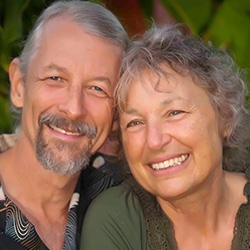
NVC Resources on Exercises and Practices
-
Often patients need enough emotional space to reduce any inner stuckness in their situation. They need to do this before they can adequately absorb information or effectively take next steps. Empathy can help with this. Empathy requires an intention to connect non-judgmentally. This gets better with practice. Read on for examples of how a situation can play out with, and without, empathy. And the difference it makes in healthcare.
-
In this audio presentation, Jori offers clarity about the three different layers of empathy and the value of differentiating each layer. If you're looking for a daily practice for deepening your empathy skills, this is for you.
-
Listen to Jim and Jori ask each other about the role of gratitude in their daily activities as they share how gratitude can be a primary tool to help us stay present and at peace.
-
This article outlines a four-part transformation process to help us recognize what's giving rise to our suffering and resentment -- and transform it into more freedom, creativity, and choice.
-
According to this article, what we do before we move into the NVC dance profoundly influences the outcome and everyone involved. This "before" step increases the likelihood of living compassionately, and our support openness to outcome. It can also make our NVC practice less connecting, and more evaluative. The article addresses these points and talks about ways to move beyond the dead past, and the imagined future, to step into the the only “time and place” that both NVC operates and that the connection we so fervently want actually exists (ie. the present moment).
-
I love the insights, resources, and inspiration I get from this course. It gives you a glimpse into the support Miki offers around deepening the practice of nonviolence in thought, word, and action.
—Lore Baur, NVCA Course Coordinator, CNVC Certified Trainer.Miki is sharing what that means "Responding to the Call of our Time" for her and invites us to feel that call. This video illustrates how she is helping participants through teaching, coaching and mentoring so they can move forward with their challenges.
-
Why is it so difficult to not take things personally? It's because everything reinforces the sense that whatever is being said is indeed about us – both from without and from within. However, we can get better at not taking things personally with a practice of shifting our focus by being open to multiple interpretations, understanding that our reaction is about our own need, and noticing how the other person’s words, no matter how they sound to us, are an expression of their needs. We can then be more present and available to navigate the situation.
-
As we head towards impending collapse the relative ease, comfort and freedom of the global north will be harder to maintain. Because of growing anxiety including from people with systemic power, we can anticipate increasing attempts at authoritarian control over the population. We can see what's occurring now as dry run practice for what's coming soon. What may help us: finding choice, knowing when to choose death, and walking towards community and life.
-
Kristin Masters explores how to approach goal-setting and self-reflection with compassion and mindfulness grounded in NVC principles. She encourages you to examine how conscious choice plays a role in how we treat ourselves and others.
-
Whether privileged or not, its not easy to see the humanity of others in different social locations, especially if their actions have unwanted impacts and have left behind our humanity. Aiming for “both sides hearing each other” empathically, and to focus on effect rather than intent when we have more privilege, may theoretically lead to liberation. Yet, in practice it can reinforce rather than transcend power differences -- unless there's specific ways to focus attention and choice. Here, its important to transform expectations into working with willingness, and within our own terms and timetable.











